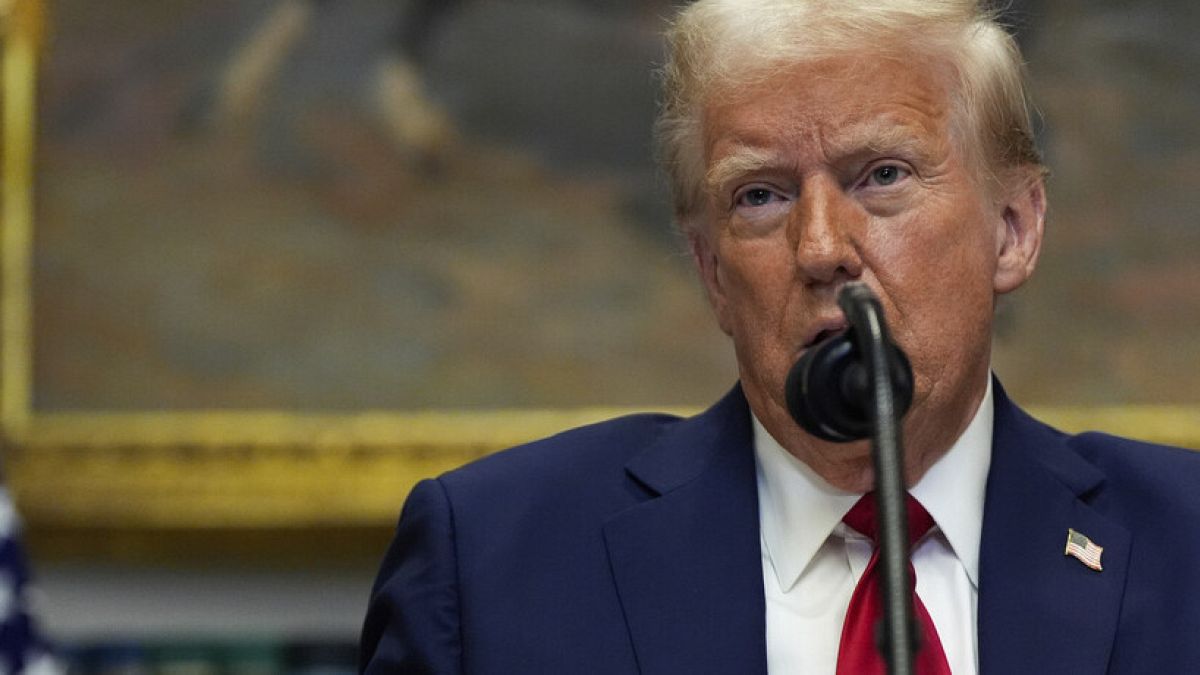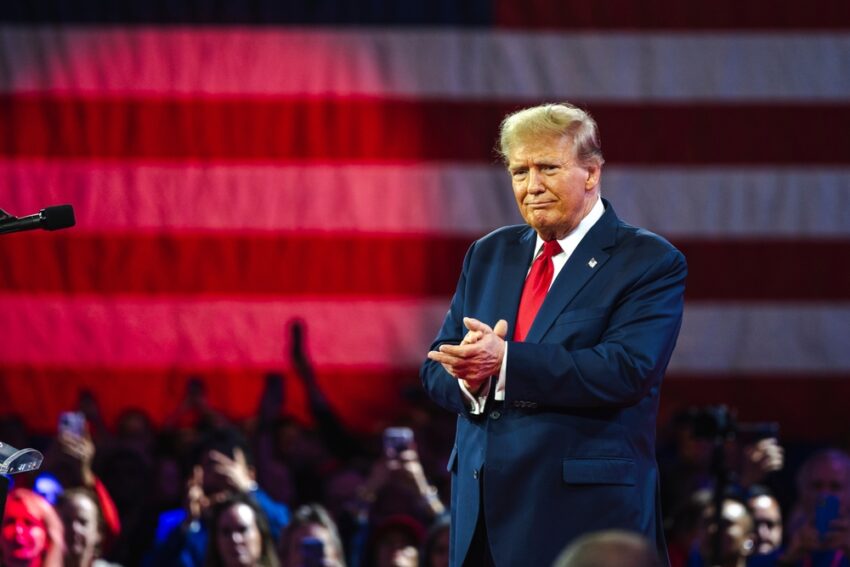Republican electric car attacks crash into Democrats’ closing message
In Michigan, New York, Montana and elsewhere, Republicans have seized on Biden administration electric vehicle policies.
Republicans are on the attack over electric vehicles, and Democrats are having a hard time finding their footing.
In tight House and Senate races in Michigan, Virginia, New York and Montana, Republican candidates are putting Democrats on the defensive by accusing the Biden administration of trying to “mandate” that drivers abandon their Chevy Tahoes for Chevy Bolts. Some Republicans are misleadingly tying EV tax subsidies to reductions in Medicare payments to drug companies.
These attacks, echoing Donald Trump’s campaign against Kamala Harris, come as multiple groups on both sides of the electric vehicle debate are joining in. Fossil fuel interests are spending tens of millions of dollars in swing-state Senate races, while environmentalists are waging their own effort to tout the benefits of driving an EV.
At a Michigan Senate debate this month, former Rep. Mike Rogers, a Republican, pointed to thousands of autoworker layoffs in the state and assailed Democratic Rep. Elissa Slotkin for a recent vote in which she refused to overturn the Environmental Protection Agency’s tightened limits on tailpipe pollution from cars and trucks.
“My opponent, multiple times, supported EV mandates, trying to pick the cars that our companies have to build and the cars that you’re going to have to buy,” he said.
Like many Republicans, Rogers has argued that China, which dominates the EV parts market, stands to be the ultimate winner.
Democrats have struggled to reassure skeptical voters. In some cases, including Slotkin’s, they have insisted that “no one’s going to mandate anything.”
That’s true, for the most part. While EPA is not outright banning gasoline-powered cars, the agency estimates the strict regulation could result in more than half of newly sold cars being zero-emission vehicles by early next decade.
Republicans think they’re winning the fight.
“What’s reflected in these campaigns is the fact that preserving choice and the types of cars and trucks people can buy is a very popular, populist position,” said Tom Pyle, president of the American Energy Alliance, which has received fossil fuel industry funding and supports Trump and some Republican congressional candidates.
“This is absolutely a great issue for the Republicans. It’s about making sure that people are free to choose,” he said.
Polling and research in recent years have shown that EVs are a polarizing topic for Americans.
Researchers at the University of California, Berkeley, for instance, found strong partisan alignment on EV adoption, while a recent poll by the University of Chicago’s Energy Policy Institute and the Associated Press-NORC Center for Public Affairs Research found that a majority of Americans do not support EV subsidies.
A Michigan poll this summer found that 55 percent of voters disapproved of Biden-Harris efforts to push EV adoption. Just 40 percent approved.
Attacks nationwide
GOP candidates have been framing EVs as a win for China, which controls much of the worldwide market for critical minerals used in their manufacture. Democrats say the Inflation Reduction Act, their 2022 climate law, is aimed at reducing China’s influence.
At the Michigan debate last week, Slotkin, a former CIA analyst, invoked national security in her backing of EV policies.
“If you’re worried about EVs being built abroad, if you’re worried about China having the supply chain, then come back and join us here in Michigan, where we’ve been trying to bring back our supply chains ever since Covid,” she said. “I’m not going to just give it up to China, and my opponent certainly seems to be OK with that.”
Slotkin has been the target of numerous ads from Rogers, Republicans and the oil industry over EVs. In her ad attempting to rebut Republican attacks, Slotkin insisted, “I live on a dirt road, nowhere near a charging station, so I don’t own an electric car.”
In fact, as Rogers’ campaign pointed out, her home is about a nine-minute drive from the nearest charging station. And most EV owners have a home charging system.
Auto-heavy Michigan has seen a focus on EVs from Trump and Harris too, with a similar accusation that Harris wants to ban gas-powered vehicles.
While she formerly supported that idea while in the Senate, Harris declared in a recent rally, “Contrary to what my opponent is suggesting, I will never tell you what kind of car you have to drive.”
On Friday, during a stop with members of the United Auto Workers — a union that had held off on supporting President Joe Biden’s reelection bid over the potential labor impact of pro-EV policies — Harris said, “We will ensure that the next generation of breakthroughs, from advanced batteries to electric vehicles, are not just invented, but built, right here, in America, by American union workers.”
Tim Walz, the Democratic vice presidential candidate, echoed his party colleagues at a recent rally in Warren, Michigan, with his own spin.
“It should just be your choice,” he said. “Nobody’s mandating anything to you. If you want to drive, like I do, a ‘79 International Harvester Scout that is sweet as hell, knock yourself out and drive it.”
Michigan Republican Rep. John James sought to tie his Democratic opponent Carl Marlinga to a gas car ban with an ad alongside the National Republican Congressional Committee. And Republican Paul Hudson criticized his opponent, Democratic Rep. Hillary Scholten, for not voting to overturn the tailpipe rule.
Beyond Michigan, Austin Theriault, the Republican challenger to Rep. Jared Golden (D-Maine), declared in an ad that he would “stop Biden’s electric vehicle mandate.” At a recent debate, Theriault blamed the IRA, which Golden voted for, for proposed EV mandates in states like Maine.
“How can you say you oppose EV mandates when there’s literally billions of dollars — look it up, I promise you … there’s billions of dollars in EV tax credits, there’s billions of dollars in build-out for infrastructure,” Theriault said. “We don’t want them in Maine. We don’t want them.”
“The fact of the matter is, there’s no EV mandate in the Inflation Reduction Act … read the bill,” Golden shot back. He boasted that he “stood up” against the “Build Back Better Act,” Biden’s initial climate and social program spending bill that got cut down to the IRA, which he supports.
In Virginia, GOP Rep. Jen Kiggans claimed in a debate that Democrat Missy Cotter Smasal, who has not held office before, “rubber-stamped” Virginia’s law to follow California’s emissions rules, including its 2035 zero-emissions standard.
‘Willful lies’
Ads featuring EVs have popped up in races like in New York’s 1st District, where a spot from Rep. Nick LaLota and the National Republican Congressional Committee say Democratic challenger John Avlon supports tax credits for EVs and cutting Medicare to pay for them.
It’s apparently a reference to the IRA, which reduced Medicare spending by letting the government negotiate drug prices and changed EV subsidy rules.
In California’s 13th District, the Congressional Leadership Fund, a super political action committee endorsed by House Republican leadership, charges that Democrat Adam Gray “wants to get gas cars … off the road.” Gray is challenging Republican Rep. John Duarte.
And in Montana, an ad from Republican Tim Sheehy and the National Republican Senatorial Committee repeats the Medicare claim, saying Democratic Sen. Jon Tester joined with other Democrats and “spent Medicare dollars on electric vehicles instead of helping seniors.”
David Kieve, president of EDF Action, said it’s understandable that voters would care about a gas car ban but that no such ban exists. The group is the advocacy arm of the Environmental Defense Fund.
“The politics around EVs broadly are great. The politics around bans of anything in this country are lousy. If you ask the American people, ‘Do you support the government taking away your blah, blah, blah,’ they’re going to say ‘no,’” Kieve said.
“Fortunately, no such ban exists, and it drives me insane,” he continued. “I think some of the people and groups that are out there spreading these willful lies should be held to account.”
EDF and EDF Action have been running ads in battleground states this year generally supportive of EVs and pro-EV policies, some of which feature Republicans.
The messaging points mainly to the consumer-facing benefits of EVs but also promotes manufacturing and other arguments in favor of them.
“They’re bringing home billions and billions of dollars’ worth of private sector investment. And Michigan is doing better than just about any state in the country,” Kieve said.
Big money from oil
One prominent force flooding the airwaves this year has been American Fuel & Petrochemical Manufacturers, the trade group for oil refiners. That sector stands to lose if the growth of EVs causes reduced demand for gasoline and diesel.
AFPM said it has spent at least $10 million in advertising against the tailpipe rule and other pro-EV policies since February on television and digital media. Data compiled by tracking firm AdImpact show the ads have been aired more than 80,000 times.
Most of the ads have mentioned Biden, Harris or vulnerable Democratic candidates.
The goal of the campaign has been to sway public opinion against the policies. Earlier ads also pushed for lawmakers to vote to overturn the tailpipe rule.
Since they’re “issue” ads that do not directly advocate for or against anyone’s election, they’re not subject to federal election laws on funding, disclosure and other matters. They’ve mentioned Democratic candidates in close Senate races in Michigan, Montana and Nevada.
“President Biden is banning most cars, putting our freedom to choose what to drive in the rearview mirror. And Sen. Sherrod Brown couldn’t stop him,” says a voice-over in one Ohio ad.
“Vice President Kamala Harris wanted to end sales of all new gas-powered vehicles by 2035, taking away our choices,” says an ad in Pennsylvania, which asks viewers to “call Sen. Bob Casey, tell him to stop the Biden-Harris car ban.”
“These policies will have tremendous, economywide consequences and impact every American driver, taxpayer and electricity user,” AFPM spokesperson Ericka Perryman said.
“There’s a troubling lack of awareness about these policies,” she said, pointing to polling commissioned by AFPM and external polling showing opposition to them when the details are explained.
“The public has spoken, and they remain vehemently opposed to any government efforts aimed at eliminating new gas cars,” AFPM President Chet Thompson said in an Oct. 1 statement on the latest round of ads. “Gas car bans and EV mandates are clearly political liabilities.”
What's Your Reaction?





















































